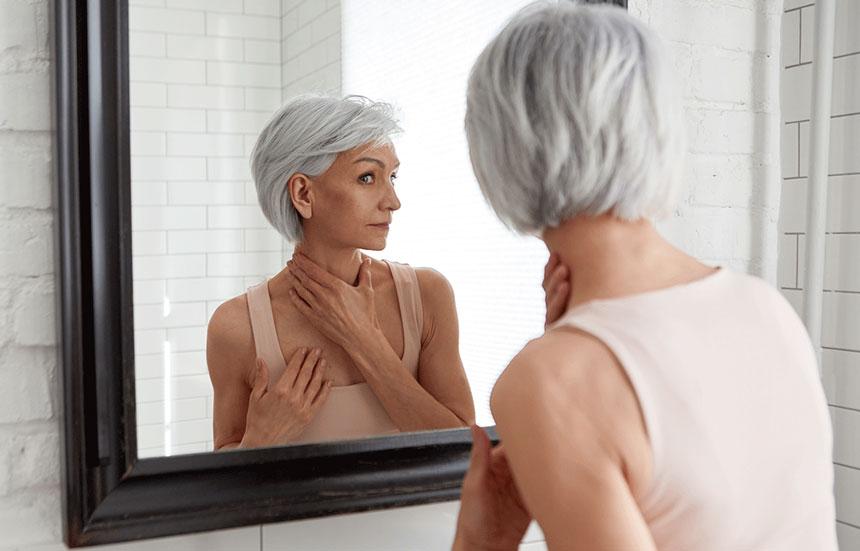7 Foods to Incorporate into Your Diet for Healthier Hair

Hair care is important to Americans. In 2022, haircare industry revenue was $13 billion. While hair care products are important if you want hair that looks healthy, it begins with nutrition, not shampoo and conditioner.
Studies have found that eating lean proteins, Omega-3 fatty acids, fat-soluble vitamins (A, D, K and E), B-complex vitamins and iron are essential for healthy hair.
“Nutrients touted for hair healthy are the cornerstones of the Mediterranean diet, says Bernard Kaminetsky, MD, medical director, MDVIP. “By following these basic tenets, you’re taking care of your hair and heart simultaneously.”
Generally, you’re better off eating healthy foods than taking supplements. Some nutrients, like vitamin D are the exception because so few foods are good sources of vitamin D.
Your body absorbs nutrients from foods better than supplements, and supplementation can lead to excessive levels of a nutrient. This can affect your hair, and more importantly, your overall health. For instance, studies suggest that having too little or too much vitamin A can lead to hair loss.
Eating for healthier hair isn’t hard. Simply add these seven easy-to-find foods to your diet.
- Avocadoes are a great source of omega-3 fatty acids, which helps lower follicle inflammation, and biotin (vitamin B7). But probably it’s biggest contribution to hair health is its significant amount of vitamin E – an antioxidant can help protect hair follicles against damage free radicals). Vitamin E also is linked with skin health, so it helps maintain a healthy scalp, which affects follicles. Avocado can be eaten plain, added to salads or made into guacamole.
- Eggs are a complete source of protein and high in zinc, biotin, choline (vitamin B12), iron, lutein and zeaxanthin (carotenoids or fat-soluble pigments that give egg yolks their yellow color) and vitamins A and D. These nutrients maintain cellular health, particularly eyes, skin and hair. Moreover, protein is important because it’s what hair follicles are primarily comprised of and biotin triggers production of keratin – a protein essential for hair growth. It's pretty easy to consume eggs, even if you dislike them. There are many ways to serve them as a dish or add them as an ingredient in recipes.
- Greek yogurt (plain) is a significant source of protein – a building block of hair. It’s also a good source of pantothenic acid (also known as vitamin B5), which promotes blood flow to the scalp, helping prevent hair loss and thinning. Yogurt also has probiotics (good bacteria) that help your body absorb nutrients, which in turn promotes a healthy hair cycle and growth. You can eat Greek yogurt plain, with berries (which are high in antioxidants) or as a substitute for sour cream and mayonnaise.
- Nuts (almonds, walnuts and cashews) are substantial in protein, omega-3 fatty acids, zinc, magnesium and biotin. Studies suggest these nutrients contribute provide nutrients to scalp tissue, strengthen hair cuticles and stimulate hair growth. Nut butters are another good option.
- Pulses (beans, chickpeas, lentils, peas) are high in protein; in fact, they’re a great substitute for meat if you’re trying to incorporate more plant-based foods into your diet. They’re also high in folate (or B9), which is linked to hair growth. One of the most versatile pulses is chickpeas. They can be eaten as is, added to salads or made into hummus.
- Pumpkin and pumpkin seeds are one of the best sources of magnesium – a mineral that’s highly involved in the hair growth cycle and a good source of vitamin C, another antioxidant. If you’re only a fan of pumpkin during “pumpkin spice season,” there are other good sources of magnesium such as almonds, spinach and cashews.
- Sweet potatoes are known for having beta carotene, the precursor to vitamin A. Beta carotene is what gives sweet potatoes and other high beta carotene fruits and vegetables such as pumpkin, carrot, mango and bell pepper their vibrant colors yellow, orange, red colors. They’re also found in green leafy vegetables like spinach. Vitamin A keeps hair shiny by prompting glands in your scalp to produce sebum, an oily substance that prevents hair from drying out and becoming dull.
“Nutrition is a key element of healthy hair. However, your overall lifestyle also plays a role,” says Kaminetsky. “Being overly stressed, overly tired or a smoker also affects your hair. If you’re struggling with any of these issues, work with your primary care physician.”
Don’t have primary care physician? Consider partnering with an MDVIP-affiliated physician. An MDVIP-affiliated doctor can customize a wellness plan to help you live a healthier lifestyle. Find an MDVIP affiliate near you and begin your partnership in health »


